
Lovers Lane UMC's deaf ministry hopes to train leaders
by Heather Noel
Published: 09 August 2013
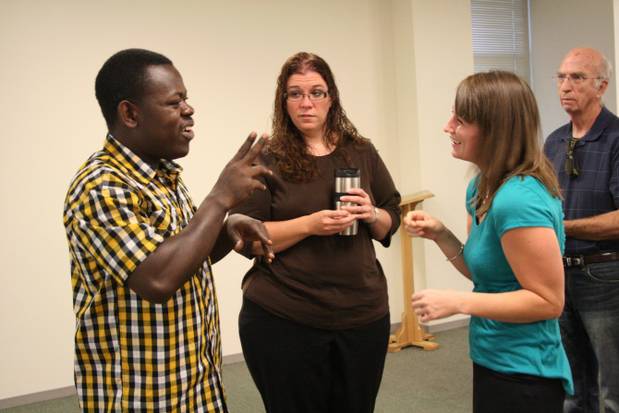
Paul Aseka uses American Sign Language to communicate with Courtney Wells with interpreter Andrea Raye watching on after a Sunday morning fellowship class of the Deaf Ministry at Lovers Lane United Methodist Church. Aseka is the ministry's first deaf intern and marks a step toward creating a program to train leaders in the deaf ministry. Staff photo by HEATHER NOEL/neighborsgo
Inside a Sunday morning fellowship class, dozens of people join in song. The lyrics ring out — not through their voices, but in a sequence of American Sign Language hand signs.
The class at Lovers Lane United Methodist Church brings in people from across the Dallas area. It is part of a ministry for a diverse group of deaf and hard-of-hearing people, and their friends and family.
From mission trips to places such as Mexico to a sign choir that performs songs in ASL, the group offers a variety of activities for involvement beyond sitting and watching an interpreter at worship services.
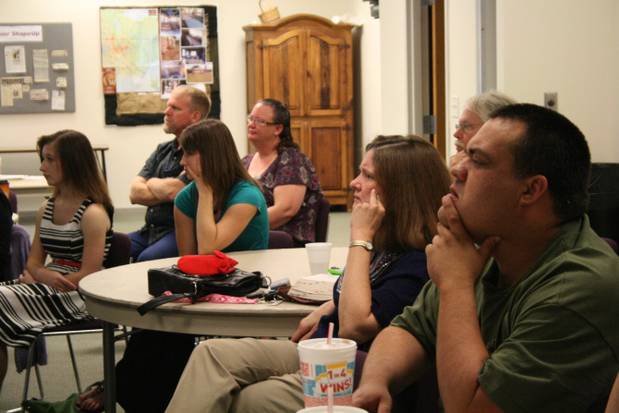
The weekly Sunday morning fellowship class of the Deaf Ministry at Lovers Lane United Methodist Church welcomes the deaf, hard-of-hearing and their friends and families. The class also attracts students from local colleges studying to be interpreters. Staff photo by HEATHER NOEL/neighborsgo
"We are a ministry that is trying to be of, for and by deaf people and their hearing friends and family who aren't able to worship and serve together in a church because of communications barriers," said the Rev. Tom Hudspeth, who helped to begin the church's Deaf Ministry in 2001.
Those communication barriers are one reason Hudspeth said he believes there are low numbers of deaf people in the U.S. who attend church and even fewer who hold leadership roles in the United Methodist Church, but he'd like to change that.
Hudspeth was born with partial hearing loss and grew up trying to hide it by wearing his hair longer to cover his hearing aid. It wasn't until age 28 when he encountered the deaf world and learned ASL.
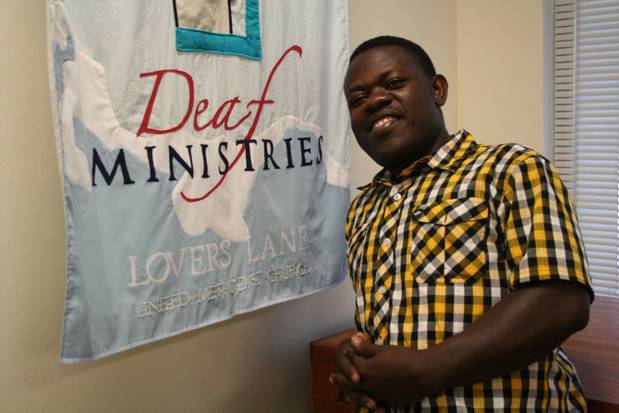
Paul Aseka began working as an intern for the Deaf Ministry at Lovers Lane United Methodist Church in May. He was born in Kenya and became deaf at age 7. He hopes to one day work in a church leadership role.Staff photo by HEATHER NOEL/neighborsgo
He said he doesn't want others to view being deaf as a hindrance or to feel they don't have the same opportunities as hearing people. Hudspeth said eventually he would like to help train deaf people to assume lay or possibly even ordained positions in the church.
With the help of a grant from the United Methodist Committee on Deaf and Hard-of-Hearing Ministries, the Deaf Ministry welcomed its first deaf intern, Paul Aseka, in May. Hudspeth views Aseka's arrival as the first step in his work to formalize a program to train deaf leaders in the denomination.
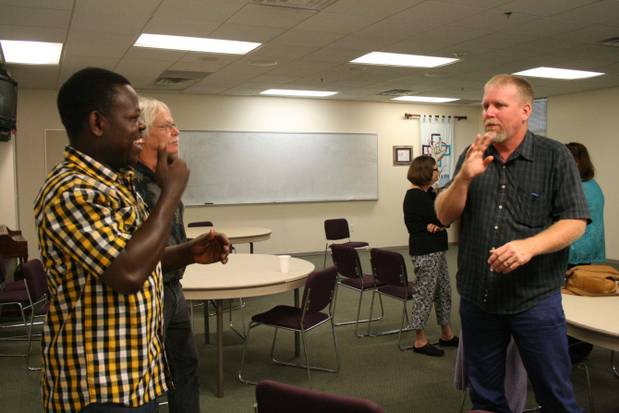
Paul Aseka uses American Sign Language to communicate with members of the Deaf Ministry at Lovers Lane United Methodist Church after a Sunday morning fellowship class. Staff photo by HEATHER NOEL/neighborsgo
A rare opportunity
Aseka, who is originally from western Kenya close to Lake Victoria, works part time shadowing Hudspeth, performing tasks ranging from visiting church members who are sick or in the hospital to helping prepare the lesson for the Sunday fellowship class. He also attends a weekly class on how to deal with grief and makes regular trips to Dallas' Deaf Action Center to teach Bible study.
Aseka said, through an interpreter, he works mostly with the deaf ministry, but he has also helped fellow Kenyans at the church and taught other church staff some basic ASL signs.
The experience is a rare opportunity in the United Methodist Church, said Carol Williams, a sub-chairwoman on the DHM grant committee. She said she knows of very few deaf pastors and is not aware of any other U.S. church in the denomination working to develop a formal program for deaf leadership training.
"It's really exciting about this prospect that we can have a program within the UMC that will bring deaf leadership up because we are so in need of that," Williams said.
Aseka said he has enjoyed learning from Hudspeth and accompanying him out in the community. One day he would like to work full time in the ministry, but his path to obtain the credentials to do so is unclear, he said.
Hudspeth hopes Aseka will be the first of many deaf people who will be given an opportunity to train to become leaders in the church, but before they can be seen as full partners in the ministry, some changes will have to be made. Hudspeth said the standards for ordination are pretty extensive and could be difficult for a deaf person to overcome, especially since finding interpreters for years of undergraduate and graduate school is difficult. Plus, because many communicate through ASL, they wouldn't be able to perform the required verbal sermons.
Finding deaf-friendly ways of training and shaping ordination requirements are still things he is working through, he said, but he hopes that having Aseka for a year will help him to take steps to sort it out. He said perhaps the church could one day establish opportunities for deaf students similar to the intern program the church already has for seminary students at Southern Methodist University.
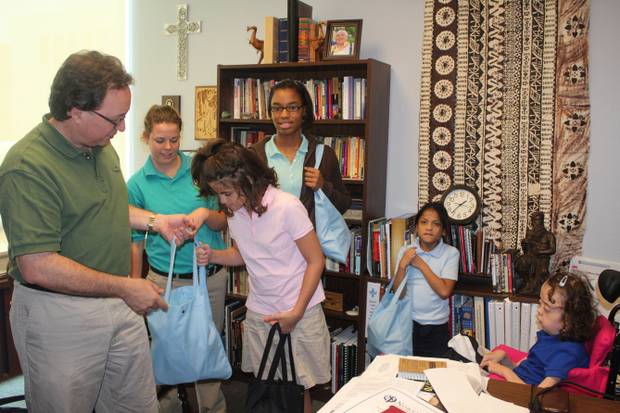
The Rev. Tom Hudspeth (far left) and students from Lovers Lane Academy for the Deaf pack bags to donate to women in Haiti. LLUMC photo submitted by PEGGY KEY
Leaders for the future
Hudspeth said the prospect of having more deaf leaders begins with growing the Christian deaf community. "If you don't have deaf people in the Christian community, there's not going to be a call to become a deaf leader," he said.
The LLUMC Deaf Ministry group, which began with only a handful of members, has grown to nearly 50 regular attendees, but Hudspeth would like to reach even more people. Peggy Key, executive director of Lovers Lane Academy for the Deaf and a deaf ministry member, along with her husband and 24-year-old daughter, who is deaf, said Hudspeth has done well involving everyone in the ministry, but other churches don't have programs with the same level of inclusiveness for the deaf and hard of hearing people.
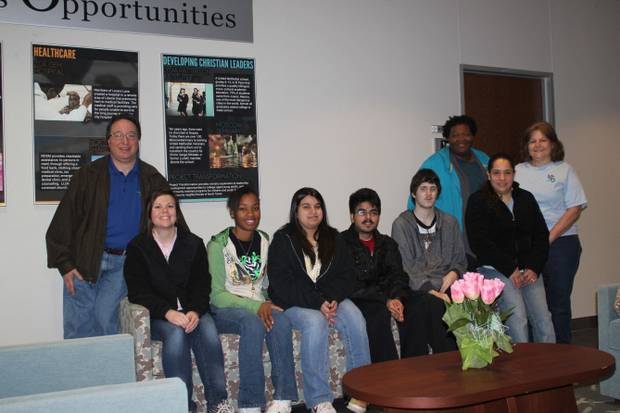
The Rev. Tom Hudspeth (far left) along with students and teachers from Lovers Lane Academy for the Deaf went to Providence Place in San Antonio for the yearly weekend retreat, Walk with Jesus. LLUMC photo by PEGGY KEY
She said many people might unintentionally think of the hearing and deaf culture as the same, but it's not.
"If a hearing person goes in and they're trying to explain things, they are thinking from their mindset. If a deaf person explains something to deaf person, there’s that instant connection," Key said.
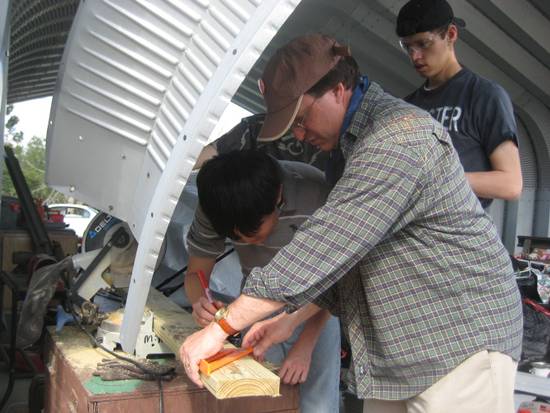
The Rev. Tom Hudspeth demonstrates how to measure, mark and cut boards for house repair during a mission trip to Santa Fe, Texas. LLUMC photo by PEGGY KEY
She said having more leaders who understand their needs could bring more deaf people into the church.
"If we can get more people to minister to the deaf that are deaf and understand what [the] deaf need and understand their culture, it will do a lot of good toward leading people towards God," she said.
Reprinted from the original article at Neighborsgo with permission.
